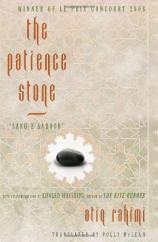Reading Group Guide
Discussion Questions
The Patience Stone

1. All of the characters in this book remain nameless. Discuss the significance of this. Why do you think the author chose not to give them names?
2. War is raging literally outside the woman’s window. At one point she refers to the city as being both deaf and blind. What does she mean by this. On the Dedication page the author writes “Somewhere in Afghanistan or elsewhere.” What do you suppose he is trying to convey with this statement?
3. The pattern of migrating birds on the curtain fabric is described repeatedly throughout the book. What is the significance of the imagery of birds suspended in flight? How does this imagery parallel the wounded man’s existence? His wife’s?
4. At the beginning of the story, the woman is distraught at the prospect of losing her husband. “Without you I have nothing!” she cries. What did she have with him? What is it that she is afraid of losing?
5. The woman begs her husband to come back to life. She wails, “you’ve no right to leave us like this, without a man.” Discuss what it means in this culture for a woman to live without a man.
6. The man’s injuries were the result of a quarrel over the honor of a woman, and yet as a result, his wife and daughters are left alone lacking the support of any men. Discuss the irony of this.
7. The woman insists that since her husband’s brothers were so proud to see him fight their enemies, they should help honor their fallen brother and themselves by helping take care of the woman and her children. Discuss the concept of honor as it is represented in this book. How does the woman’s idea of honor differ from the perspective of her husband and his family?
8. “After all he fought in your name for so long. For Jihad!” the woman pleads with God. Why do you suppose she feels she is owed divine intervention?
9. The woman attempts to inflict pain on her comatose husband by pressing hard on his bullet wounds. Frustrated at his lack of response she yells, “Even injured you’ve been spared suffering!” What does she mean by this? Who do you see as suffering the most in this story?
10. At first the woman is devoted to praying for her husband, reading the Koran, and reciting the names of God in her desire to see him healed. At one point she seems to lose her will to pray, believing God will save him without her help. Has she lost her faith? What was the turning point for her where she stopped taking responsibility for his recovery?
11. The woman recounts an incident where her husband raped her but then realizes she was menstruating and beat her for defiling him and making him unclean. Who was defiled in this situation? Discuss the dichotomy of the men’s perceptions in this book of blood as both clean and impure.
12. Flies, spiders, and wasps appear frequently throughout this book. Discuss the meaning of this imagery.
13. Discuss the significance of the peacock feather and what it represents.
14. The woman reveals that her father agreed to give her up for marriage to a man her family had never met and that their marriage occurred before they ever met. Cast off by her own father, mistreated by her husband, and ultimately abandoned by his family, who in this story shows the woman love and respect?
15. When the woman begins her liaisons with the young boy, he shows her tenderness by bringing her gifts and opening up to her about his own oppressive existence. What emotions does this boy ignite in her? She in him?
16. Once the woman starts divulging her deepest, darkest secrets to her comatose husband, she begins to get afraid that confessing her sins will destroy her, that by divulging her secrets to her husband he will gain possession over her. Does telling the truth set her free in any way?
17. As the woman grows more physically and emotionally intimate with her husband, she feels closer to him than ever before. In what ways is this closeness real? Imagined? She begins to believe that her confessions have fundamentally changed him and that if he comes back to life he’ll be a better man. Who has been changed in this relationship? Were you hopeful that she might be right?
18. Discuss the ending of the story. Do you believe the man was conscious all along of everything that was being said and done in the house? A khanjar (the weapon the woman drives into her husband’s heart) is a symbolic weapon worn by men after puberty. Discuss the significance of the use of this particular object by the woman. How do you explain lack of blood from the wounds she inflicts on him? What is your interpretation of the knock on the door and the person who enters the room?
The Patience Stone
- Publication Date: January 19, 2010
- Hardcover: 160 pages
- Publisher: Other Press
- ISBN-10: 1590513444
- ISBN-13: 9781590513446







